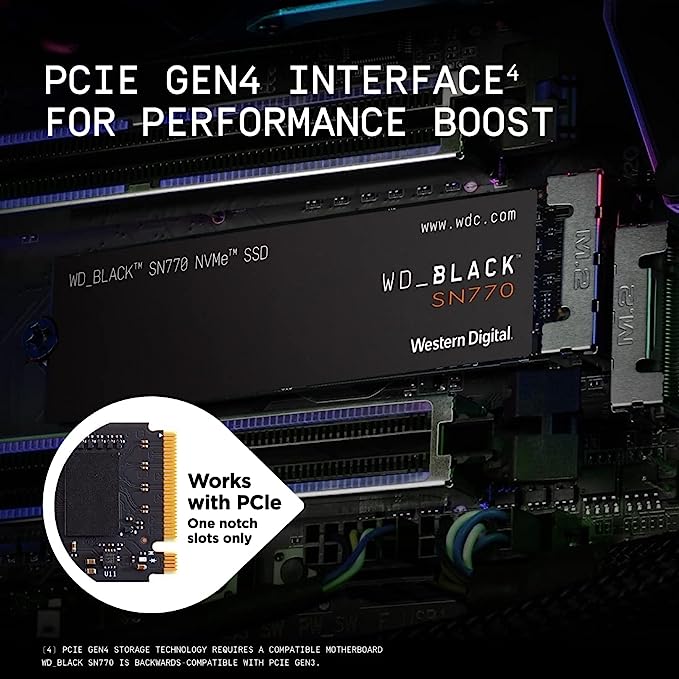Western Digital WD_BLACK 2TB SN770 NVMe Internal Gaming SSD Solid State Drive
Get ready to game even faster with the WD_BLACK SN770 NVMe SSD Solid State Drive.
Zoom past load times and get into the action now with a purpose-built gaming drive that boasts up to 40% faster performance and up to 20% more power efficiency at maximum speed over the previous generation(3).
Introduction: The Shift in Data Storage
The evolution of data storage technology has been pivotal in shaping the landscape of modern computing. From the era of magnetic tapes and hard disk drives (HDDs), we have witnessed a significant shift towards more efficient and robust storage solutions. At the forefront of this revolution are solid-state drives (SSDs), which have transformed how data is stored and accessed in computers and devices worldwide.
What are Solid-State Drives?
SSDs are a type of non-volatile storage media that store and retrieve data using flash memory, a form of electronic non-mechanical memory chip. Unlike traditional HDDs, which use rotating disks and read/write heads, SSDs have no moving parts. This fundamental difference results in numerous advantages that SSDs have over HDDs.
Key Features of Solid State Drive

Faster Data Access Speeds
One of the most noticeable benefits of SSDs is their speed. SSDs offer significantly faster data access speeds, reducing boot times and enhancing overall system responsiveness. This speed advantage is due to the way SSDs access data directly from individual memory cells, eliminating the need for mechanical movement.
Enhanced Durability and Reliability
The lack of moving parts in SSDs not only contributes to their speed but also enhances their durability. They are less susceptible to physical damage, making them ideal for laptops and mobile devices. Additionally, SSDs are less prone to mechanical failures, providing greater data security and reliability.
Energy Efficiency and Noise Reduction
SSDs consume less power compared to HDDs, which is particularly beneficial for portable devices where battery life is crucial. They also operate silently, as they don’t have any mechanical parts, making them a preferred choice in quiet working environments.
The Evolution of SSD Technology
From Luxury to Mainstream
Initially, SSDs were expensive and offered limited storage capacity, restricting their use to niche applications. However, advancements in NAND flash memory technology have led to a significant reduction in cost and an increase in storage capacity. Today, SSDs are widely accessible, becoming a standard component in many consumer electronics, including laptops, tablets, and smartphones.
Solid State Drive Technological Innovations
The continuous development in SSD technology has led to innovations such as 3D NAND technology, which stacks memory cells vertically, significantly increasing storage capacity while reducing the cost per gigabyte. The introduction of NVMe (Non-Volatile Memory Express) interface has further enhanced the performance of SSDs, particularly in high-end computing tasks.
Impact of Solid State Drive on Various Fields
Revolutionizing Personal Computing
The integration of SSDs into personal computers and laptops has revolutionized user experience. Systems equipped with SSDs boot faster, run applications more smoothly, and offer quicker file access, dramatically enhancing productivity and user satisfaction.
Transforming the Gaming Industry
For gamers, SSDs have changed the game. Faster loading times and improved game performance are just the tip of the iceberg. The ability of SSDs to quickly render complex environments and textures has enabled a more immersive gaming experience.
Advancing Data Centers and Enterprise Solutions
In the realm of data centers and enterprise solutions, SSDs have become invaluable. Their high-speed data transfer rates and reliability have greatly improved the efficiency and performance of data centers. SSDs are particularly beneficial in tasks that
require rapid data access and processing, such as in cloud storage and big data analytics. The enhanced performance and reduced power consumption of SSDs have also led to more environmentally friendly and cost-effective data center operations.
Future Prospects and Challenges
The Role of SSDs in Emerging Technologies
As we venture into the era of AI, IoT, and 5G technology, the role of SSDs becomes increasingly significant. The need for fast, reliable, and high-capacity storage is paramount in supporting the data-intensive demands of these technologies. SSDs are expected to play a critical role in enabling real-time data processing and edge computing applications.

Challenges and Innovations
While SSDs offer numerous advantages, they also face challenges such as limited write cycles and data recovery complexities. However, the industry continues to innovate, addressing these challenges through new technologies like Wear Leveling and 3D XPoint, a new type of non-volatile memory that offers higher endurance and speed.
Conclusion: Solid-State Drive – The Future of Data Storage
Solid-state drives have not just replaced traditional hard drives; they have redefined the standards for data storage and access. As SSD technology continues to evolve, it promises to unlock new potentials and pave the way for future advancements in computing technology. The impact of SSDs extends beyond faster and more reliable storage — they are a cornerstone in the ongoing evolution of digital technology, driving change and innovation across various sectors.

Western Digital WD_BLACK 2TB SN770 NVMe Internal Gaming SSD Solid State Drive
Get ready to game even faster with the WD_BLACK SN770 NVMe SSD Solid State Drive.
Zoom past load times and get into the action now with a purpose-built gaming drive that boasts up to 40% faster performance and up to 20% more power efficiency at maximum speed over the previous generation(3).









